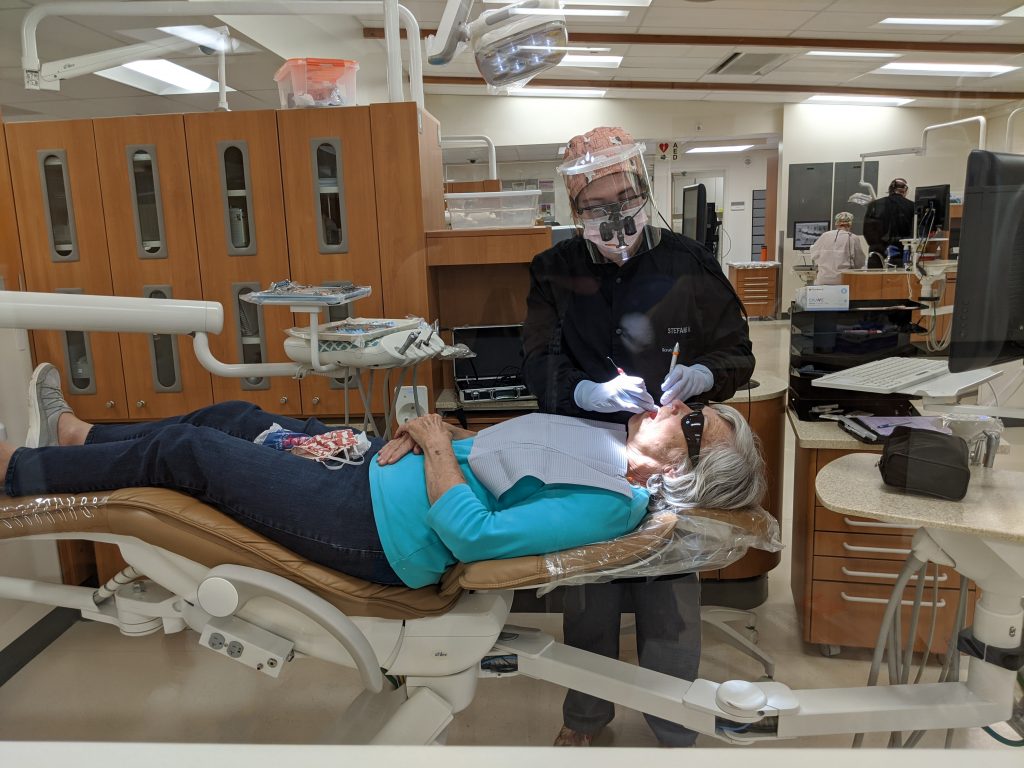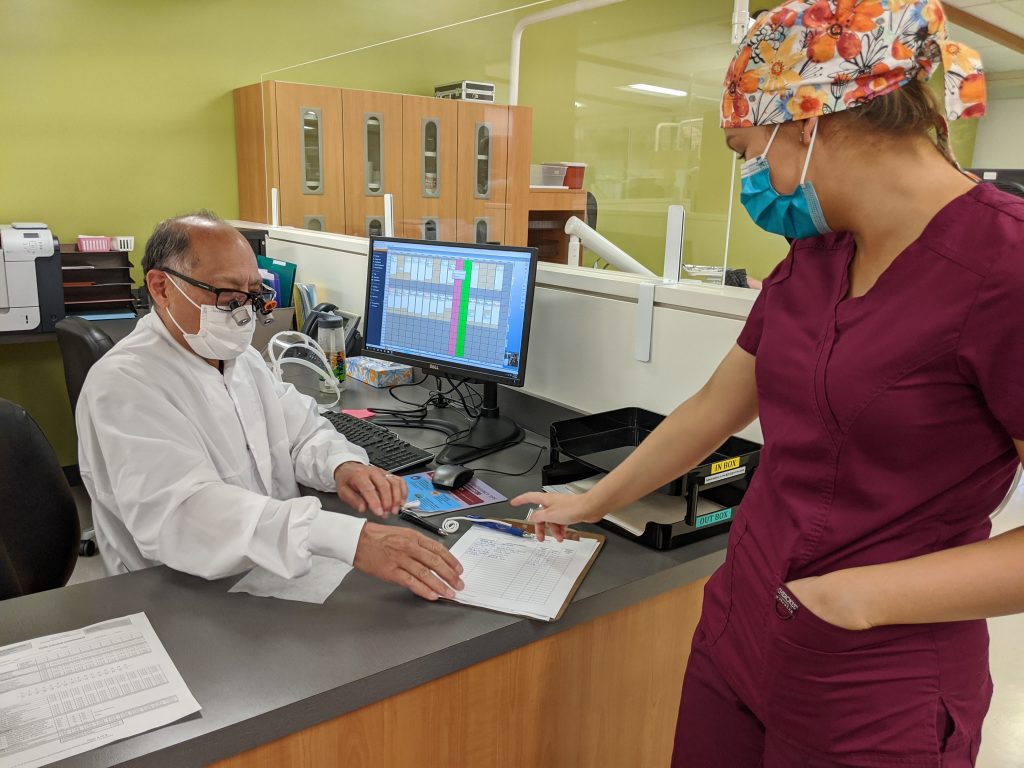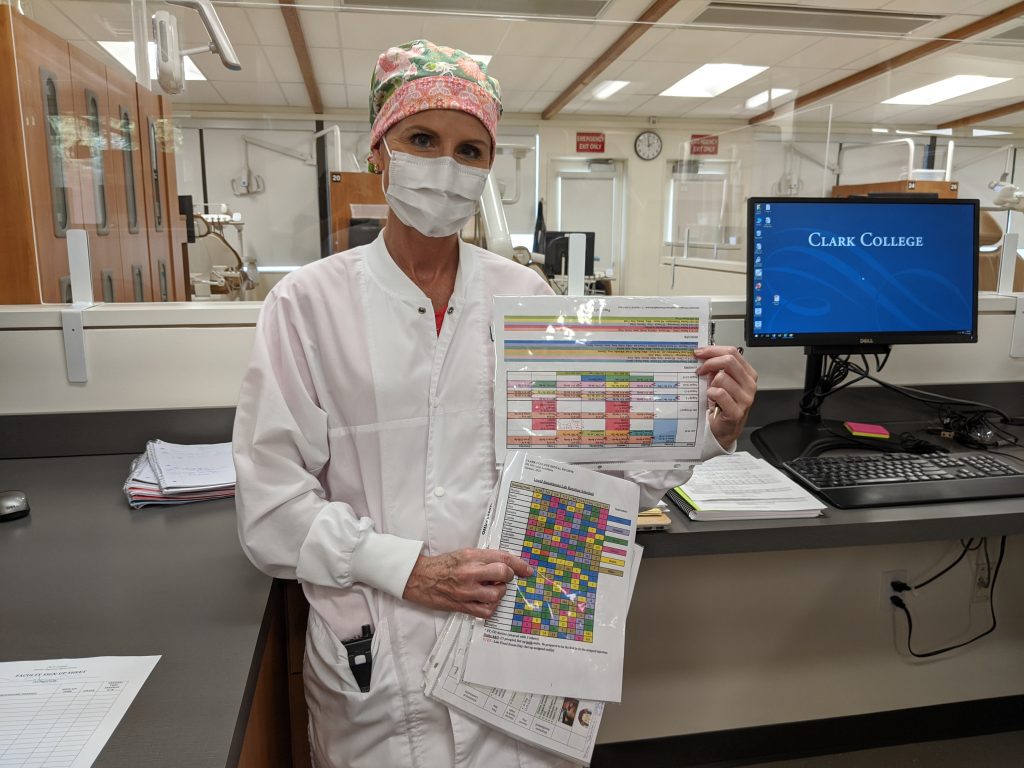Dental clinic re-opens

For 51 years, Clark College’s dental hygiene clinic provided affordable dental service to the community—until the COVID-19 pandemic forced it to close in spring term. Now, thanks to careful planning by the college’s dental hygiene program, the Firstenburg Dental Hygiene Education and Care Services is back open to serve the community and train the next generation of dental caregivers.
The clinic is a win-win for both the community and the students.
“It’s a two-way street,” says Program Director Kristi Taylor. “We’re helping the community, but they’re helping the students gain real-world experience. We’ve set up our clinic so students have the feel of a private practice. Our goal when students leave here is to be prepared to walk into a private practice. They are very job-ready.”
COVID-19 safety measures added
Before the clinic could reopen, Taylor and instructors scrambled to adapt the lab classes and clinic to meet safety guidelines prescribed by the Centers for Disease Control, Washington State Department of Health, and American Dental Association to protect students, staff and patients.
“It’s a lot of changes across the dental and medical fields,” says Taylor.
The program was helped by the fact that many safety procedures were already in place. Even before the pandemic, students and instructors wore face masks in the clinic when working directly with patients. Frequent handwashing and wearing gloves were also standard.
“We have always been very conscious of infection control,” Taylor says.
Since COVID-19, the program has implemented these new safety measures:
- Scrub caps now are mandatory.
- Clear plastic face shields are worn by students or instructors who are within six feet of a patient.
- Two-feet-tall clear plastic partitions were installed to separate individual stations (called “operatories”) from each other and from common spaces.
- Following social distancing guidelines, the clinic has reduced the number of patients and students on site. The clinic has 30 operatories. Normally, 25 students are working at a time, and they treat 22 patients. Due to COVID restrictions, the students and patients are divided into two groups, and only 10 to 15 patients are scheduled at a time.
- N-95 masks will be required when the clinic is using aerosols again. For now, the program has opted out of using aerosols in the clinic because they potentially could spread COVID-19 particles through the air. Normally, student hygienists use aerosols to polish teeth and to cut out decay before filling cavities. During the pandemic, if a patient needs a filling, the clinic refers them to an outside dental office.
“These precautions are probably long overdue,” Taylor says. “I think we’ll see many of these safety measures remain [after COVID-19].”
Students were assigned patients to call and explain the safety protocols put in place. Some patients chose not to come into the clinic during the pandemic.

A dentist oversees every clinic session. On this day Dr. Eugene Sakai, retired from his own dental practice, is on site to examine patients and diagnose issues, do soft-tissue exams, and look for disease.
Dr. Sakai says, “COVID is changing things a lot.”
CDC guidelines recommend that people maintain six feet distance from others.
“We cannot do our work from six feet away,” Taylor says. “A lot of active hygienists have decided to retire due to COVID.”
As a result, Taylor says, the industry is short of hygienists. This is good news for Clark’s student hygienists.
Taking care of students
Public health restrictions meant instructors and students worked remotely Spring quarter. Before COVID-19, students had all face-to-face classes, except for one online class per quarter. It took team effort to adapt Spring classes for remote learning. By moving the didactic portion into spring and the labs/clinics into summer, instructors didn’t have to create many instruction videos.
Dental hygiene students who were scheduled to graduate Spring term had missed an entire quarter of crucial hands-on instruction, both in the lab and working with patients in the clinic. Taylor and her team got to work figuring out how to schedule clinical hours for all students while also observing the social distancing protocols that reduced the number of students allowed to work simultaneously and the number of patients allowed in the clinic.
By the time dental hygiene students returned to campus on June 21, all the lead instructors had put together a plan for their respective clinics.
“We all worked together to create the overall schedule of courses that included all the labs and clinics they had missed in the spring,” Taylor says.

Then all the plans were compiled onto a detailed, color-coded schedule to ensure all students completed their required hours for labs including local anesthesia, nitrous oxide, radiology, cleaning and clinic. Implementing social distancing while compressing all the labs and clinical experience into the shorter summer schedule has required most students and faculty to work six-day weeks, and to sometimes work Sunday too.
“This summer has been full of catching all the students up on their hands-on skills,” Taylor says.
“It’s been really hard on the students,” adds instructor Amy Johnson.
The Bachelor of Applied Science in dental hygiene is a four-year degree. The dental portion takes two years to complete. Each year about 100 potential students from as far away as Seattle and California apply for the program’s 25 slots.
“Students can come to Clark, pay a much lower tuition [than at a four-year university], and get the same training,” Taylor says.
Seniors will graduate at the end of August after completing their hands-on clinics.
Taylor says some students already have jobs waiting as soon as they pass their six clinical boards and get their license to practice.
“In recent years, all of our students have found jobs,” Taylor says. “I get four to six phone calls a week from dental offices looking for hygienists. I’m extremely happy we could return to the lab.”
Clark’s dental hygiene clinic is open to the public and offers affordable dental care to adults and children. To schedule an appointment, call 360-992-2158. Learn more at www.clark.edu/dentalhygiene.